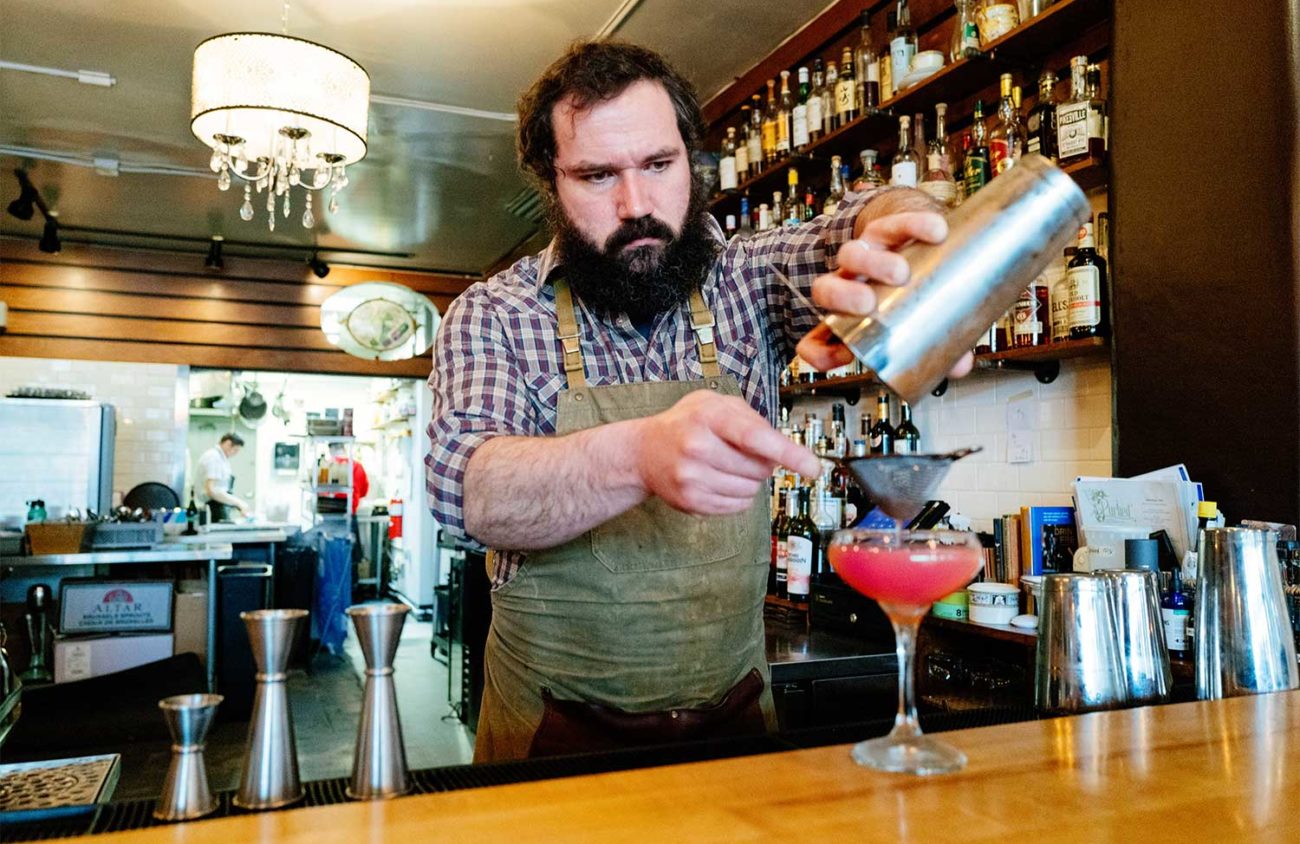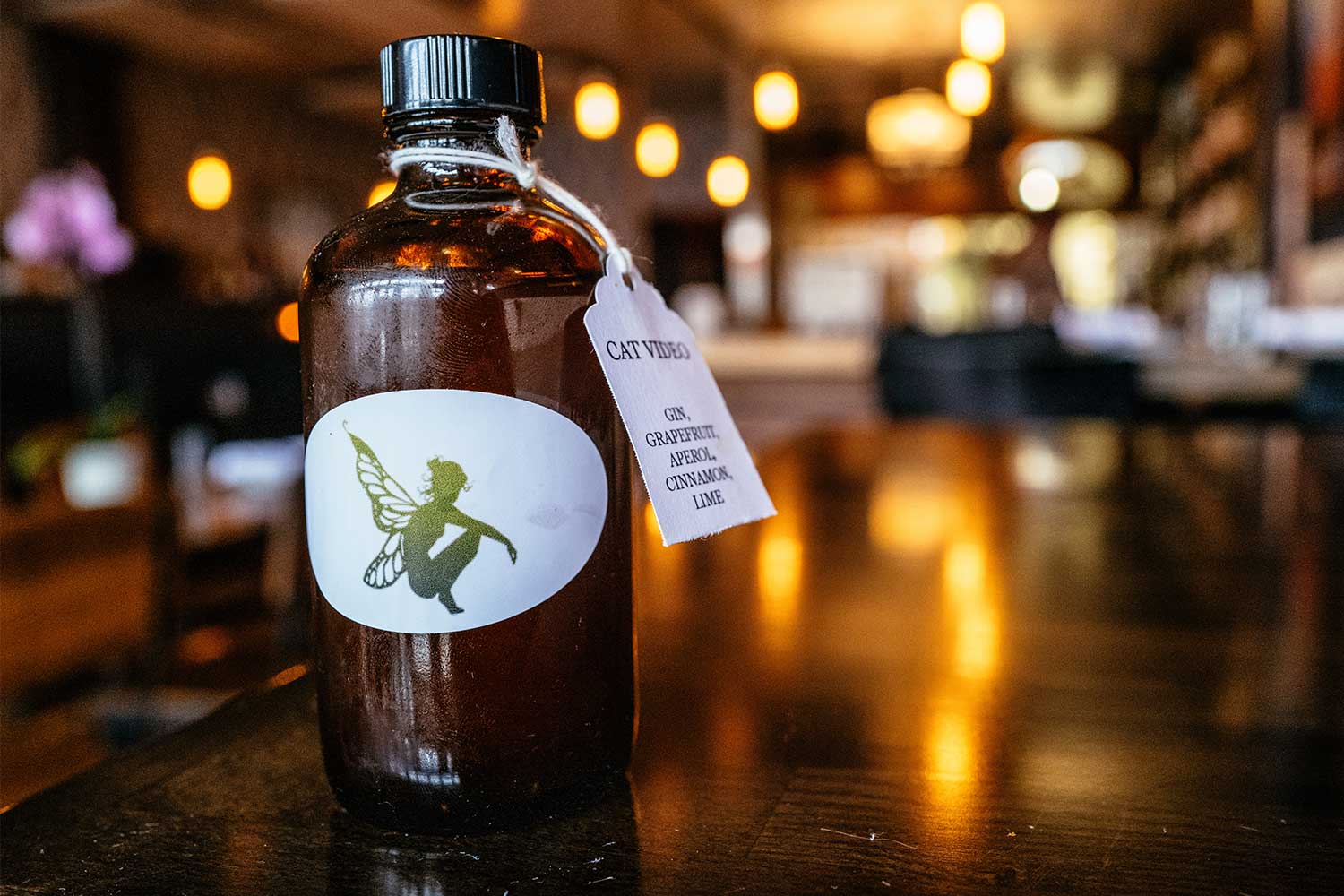A great cocktail is a magic trick. It appears almost out of thin air. One or two of the ingredients on the menu might spark interest in a drink, and then expectations build. The drink is assembled — just for you — and when it’s great, it’s a joy.
Since Dec. 23, 2020, to-go cocktails have been legal in Oregon, and if the less-than-enthusiastic outcome of legalization in Eugene has taught us anything, let it be, as local bartenders say, that the greatest cocktails will always belong at bars, not the back of the fridge.
Local restaurants have put their best foot forward by offering many takeout options, whether it be cocktail premixes or single serving bottled cocktails. But more than a year later, translating a great experience for to-go cocktails has seen mixed results. The new law hardly remains the ray of hope for small businesses it once seemed during the height of pandemic hysteria.
One of Izakaya Meiji’s most seasoned bartenders, Ryan Prescher, says the feeling seems to be universal. “There was a hope that, in lieu of being able to sit at a bar, to-go cocktails could fill that void,” Prescher says. “As the pandemic rolled on and on, it became pretty clear that there’s something more to cocktails than just the ingredients, and there just wasn’t a strong enthusiasm about it.”
The battle for what beverage occupies your dinnertime and social gatherings now seems more crowded than ever, with not much place for restaurant made-to-go cocktails. A dizzying selection of craft beer and Willamette Valley wine awaits the consumer at almost every store.
Joseph Kiefer-Lucas, co-owner of French-style bistro Bar Purlieu, has been selling bottled wine since its grand opening but didn’t see a similar demand with to-go cocktails: “Wine, especially early on, we were selling like crazy to go, and that just continued, it just happened. It could just be that we’re more of a wine and beer country.”
Bar Purlieu still offers to-go cocktails even though the demand is mixed. “When we started we had about five for sale, and I just didn’t know in what volume any of them would sell, and doing a big batch in the morning for one of them would’ve been a bad idea,” Kiefer-Lucas says. “It was never a huge thing, but we just figured it would be bigger than it was.”
Bar Purlieu’s premixes — as in everything but the alcohol — sell more reliably than their individual to-go cocktails. The downside of these premixes for the bar is the relatively low price point.
Other hurdles for this new concept are pandemic related. Kiefer-Lucas scrambled to test out which cocktails would maintain a quality flavor after being bottled and sent home with customers. Then even procuring the bottles took additional effort. A worldwide supply chain shortage saw the bar’s first online order of bottles take three months to be delivered, leaving the bar to scour local homebrew stores in the area to cobble together enough bottles to sell to-go cocktails.
Then came ingredient shortages. “I have had several drinks on the menu that I’ve had to stop because of supply issues,” Kiefer-Lucas says. “I can’t make this drink anymore because this gin isn’t available and the liquor store doesn’t know when they’ll get it in again. I didn’t make any new drinks or anything over the summer because we were just so busy, we’re doing Friday numbers on Wednesday and we’re short on staff.”
Many restaurants share Bar Purlieu’s problem: being understaffed and overworked in a historic labor shortage. According to Prescher, Meiji made an earnest but ill-fated attempt at balancing takeout with indoor dining. “There was about a week of crossover before we just realized it wasn’t worth it.”
It’s hard to see any resemblance between a Manhattan served in a dimly lit room, with the bustle of servers, bussers and bartenders on a Friday night, and a plastic take-out bottle. “I think the value is multifaceted,” Prescher says. “It starts with your relationship with the bartender. Even if you’re not a regular, the way you interact with your bartender and the way they guide you to a positive experience you can’t have with to-go cocktails inherently.”
The pandemic, paired with changing trends in dining that favor fast casual and food carts, is rapidly shifting the restaurant industry, but bars haven’t changed much since the saloon days. A night out with a cocktail feels a little timeless. As long as we remain human we will always find our way to a cocktail or even mocktail in their proper environment: a bar.
Thor Slaughter is the bar manager of Akira at 359 Mill Street.

